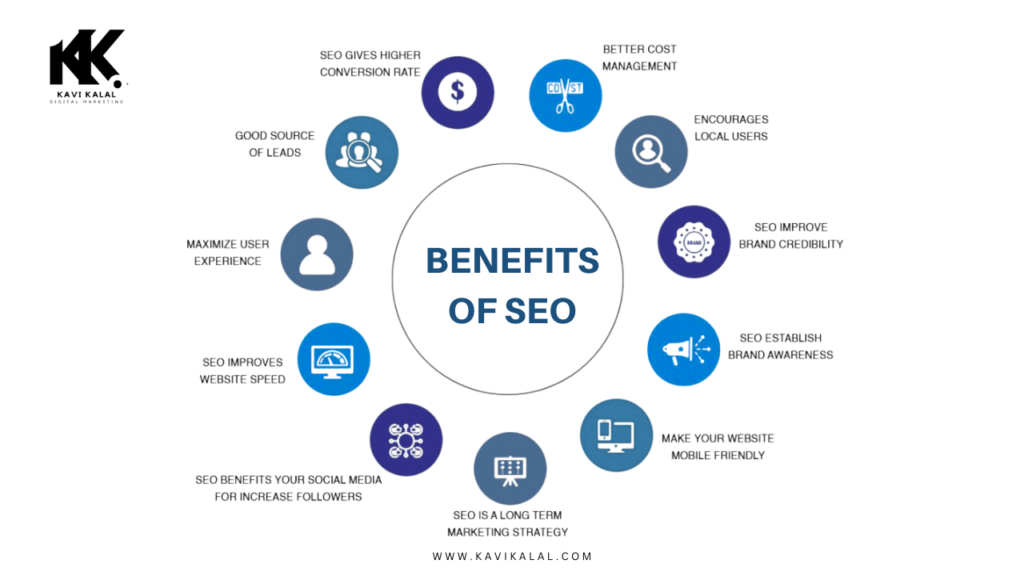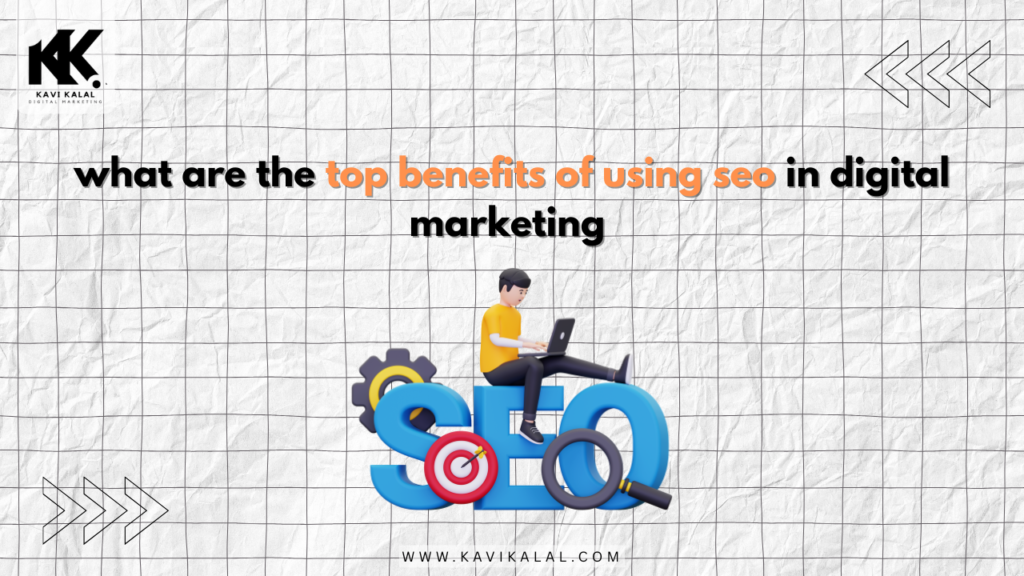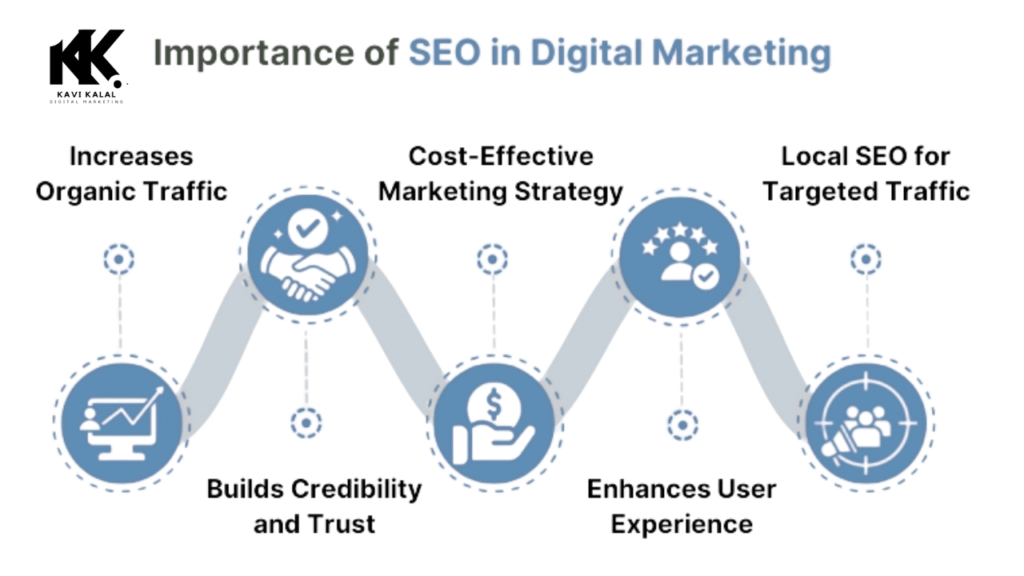Table of Contents
Toggleintroduction
In today’s highly competitive digital world, standing out online is more important than ever. That’s where the benefits of SEO in digital marketing come into play. Search Engine Optimization (SEO) is not just a trend—it’s a foundational strategy that drives visibility, builds trust, and helps businesses grow. Understanding why SEO is important for digital marketing can be the key to unlocking long-term success for any brand.
One of the top advantages of SEO is that it connects you with users actively searching for your services. Whether you’re a startup or an established company, the importance of SEO in online marketing lies in its ability to attract quality traffic and generate consistent leads. There are countless SEO benefits for businesses, especially those aiming to build authority and increase website reach.
If you’re wondering how SEO helps in digital marketing, consider its role in boosting search rankings and improving user experience. The role of SEO in digital marketing is essential for driving engagement and conversions. The real advantages of using SEO are reflected in measurable growth, higher credibility, and better ROI. That’s why SEO is important for business today—it delivers lasting value and significant SEO benefits for website traffic and brand recognition.
1. Understanding the Benefits of SEO in Digital Marketing
In the modern online landscape, understanding the benefits of SEO in digital marketing is essential for businesses that want to thrive. SEO, or Search Engine Optimization, is the process of improving your website’s visibility on search engines like Google. When done correctly, it helps your content appear higher in search results, attracting more potential customers without paid advertising.
One of the main benefits of SEO in digital marketing is organic reach. Instead of relying solely on paid campaigns, SEO helps you connect with people who are actively searching for your products or services. It builds long-term value by driving continuous traffic to your website.
Additionally, SEO enhances user experience by making your site faster, mobile-friendly, and easier to navigate. This not only pleases your visitors but also increases your chances of ranking higher in search engines. By implementing a strong SEO strategy, businesses can increase brand awareness, credibility, and conversions.
When you understand the true benefits of SEO in digital marketing, it becomes clear that it’s not just a tactic—it’s a powerful, cost-effective tool for sustainable growth and visibility in a competitive digital world.
2. Why SEO is Important for Digital Marketing Success
Understanding why SEO is important for digital marketing is crucial for any brand that wants to thrive online. In a world where most customers begin their journey on search engines, SEO acts as a powerful tool to place your business in front of the right audience. It’s not just about ranking higher—SEO is about relevance, visibility, and credibility.
One reason why SEO is important for digital marketing is that it targets users with clear intent. When someone searches for a service or product you offer, SEO helps ensure your website appears in those search results. This leads to higher click-through rates and better engagement from genuinely interested visitors.
SEO also supports every other digital channel. Whether it’s content marketing, social media, or email campaigns, an optimized website helps all efforts work more effectively. Moreover, with the right SEO strategy, you gain measurable insights into your audience, traffic sources, and user behavior.
In simple terms, why SEO is important for digital marketing comes down to long-term value. Unlike paid ads, SEO keeps bringing in results over time, making it a foundational investment for sustainable online success.
3. Top Advantages of SEO That You Can't Ignore
The top advantages of SEO extend far beyond just better rankings. For any business aiming to grow online, SEO offers a powerful and cost-effective strategy to increase visibility, drive consistent traffic, and build long-term credibility. One of the most significant top advantages of SEO is that it brings in organic traffic—visitors who are actively searching for the products or services you offer.
Another benefit is trust. Users tend to trust websites that rank high on search engines, which boosts your brand’s reputation. SEO also improves user experience by optimizing site speed, mobile responsiveness, and navigation. These enhancements not only keep visitors engaged but also signal search engines that your website offers value.
Unlike paid advertising, which stops the moment your budget ends, SEO provides lasting results. Once your pages rank well, they continue attracting traffic without ongoing costs. The top advantages of SEO also include better ROI, improved local visibility, and insights into customer behavior through analytics.
When implemented strategically, SEO becomes a cornerstone of digital success. It’s not just a marketing tool—it’s a long-term growth engine that keeps delivering results, making it a non-negotiable element in today’s competitive online environment.

4. The Importance of SEO in Online Marketing Strategy
When it comes to building a successful online presence, understanding the importance of SEO in online marketing is crucial. SEO (Search Engine Optimization) ensures that your website ranks well on search engines like Google, which directly impacts how visible your business is to potential customers. Without a strong SEO strategy, even the most well-crafted digital marketing efforts can go unnoticed.
SEO is essential for driving organic traffic to your website, helping you reach individuals who are actively searching for products or services similar to what you offer. The importance of SEO in online marketing lies in its ability to bring qualified leads and visitors without relying on paid ads.
Moreover, SEO is a long-term strategy that doesn’t stop once you achieve top rankings. The work you put into optimizing your site—whether it’s improving load speed, enhancing mobile compatibility, or creating user-friendly content—creates a solid foundation for continued growth. Over time, your website becomes a trusted resource, increasing brand credibility and fostering stronger relationships with users.
Ultimately, the importance of SEO in online marketing is about sustainability. By consistently optimizing your website, you create ongoing opportunities for engagement, conversions, and long-term success in an increasingly competitive digital environment.
5. SEO Benefits for Businesses of All Sizes
Regardless of your business size or industry, the SEO benefits for businesses are immense and far-reaching. Whether you’re a small local business or a large enterprise, SEO plays a pivotal role in ensuring your brand stands out in the crowded digital marketplace. By optimizing your website and content for search engines, businesses can attract targeted traffic that is more likely to convert into loyal customers.
One of the primary SEO benefits for businesses is increased visibility. In a world where most online experiences begin with a search engine, having a solid SEO strategy can make a significant difference in whether your business is discovered. Properly executed SEO allows businesses to rank higher in search results, giving them a competitive edge.
For smaller businesses, SEO is an affordable and highly effective marketing tool. Unlike paid advertising, SEO offers long-term benefits with consistent results over time. Larger enterprises can also benefit by refining their SEO strategies to maintain their market position and enhance brand authority.
Moreover, SEO enhances the user experience, making websites faster, more accessible, and mobile-friendly—key factors that contribute to customer satisfaction. With these SEO benefits for businesses, it’s clear that every business can leverage SEO to grow and succeed online.

6. How SEO Helps in Digital Marketing Campaigns
SEO plays an integral role in driving the success of any digital marketing campaign. It’s not just about optimizing content for search engines—it’s about creating an experience that resonates with users while also aligning with marketing objectives. By improving your website’s visibility, SEO enhances the effectiveness of other digital marketing strategies, such as content marketing, social media, and email campaigns.
One of the main ways how SEO helps in digital marketing is by ensuring that your content ranks higher in search engine results, reaching a wider audience. High-quality SEO allows businesses to connect with people who are actively seeking their products or services, making marketing campaigns more relevant and cost-effective.
Furthermore, SEO helps in digital marketing by enhancing the user experience. By improving site speed, navigation, and mobile responsiveness, SEO ensures that visitors stay longer and are more likely to convert into customers. As a result, businesses benefit from better engagement and increased conversions from their digital marketing efforts.
Incorporating SEO into your digital marketing campaigns not only amplifies visibility but also ensures that every aspect of your online presence is optimized for success. It creates a strong foundation that supports all other marketing initiatives, leading to higher ROI and sustained business growth. To gain expertise in these strategies, many professionals opt for a digital marketing course to stay competitive in the evolving landscape.
7. The Crucial Role of SEO in Digital Marketing
In today’s digital landscape, the role of SEO in digital marketing is more crucial than ever. SEO serves as the backbone of most online marketing strategies, ensuring that content is visible to the right audience at the right time. Whether it’s through search engine results, social media, or paid ads, SEO enhances the performance of digital marketing efforts by attracting relevant, organic traffic.
The role of SEO in digital marketing extends beyond simply ranking high on search engines. It involves aligning your website’s content with user intent, which improves engagement and conversion rates. SEO helps businesses meet their marketing goals by connecting with individuals who are already interested in what they offer. This not only boosts brand visibility but also establishes long-term relationships with potential customers.
Moreover, SEO optimizes the overall digital experience by improving site usability, speed, and accessibility. By providing a seamless and valuable experience, SEO ensures that visitors have a positive perception of your brand, which ultimately leads to higher customer retention and loyalty.
In summary, the role of SEO in digital marketing is central to driving online success. It acts as a key enabler for sustained growth, helping businesses navigate the ever-evolving digital landscape while staying ahead of the competition.
8. Advantages of Using SEO for Long-Term Growth
One of the greatest advantages of using SEO is its ability to drive long-term, sustainable growth for your business. Unlike other marketing techniques that offer short-term results, SEO builds your online presence over time, providing ongoing visibility without continuous investment. By optimizing your website and content, you’re creating a foundation for consistent organic traffic that continues to yield results well into the future.
The advantages of using SEO for long-term growth extend beyond simple website traffic. As your website climbs in search engine rankings, it attracts more relevant visitors who are actively looking for what you offer. This increases the likelihood of conversions, as you’re reaching individuals who already have intent.
SEO also enhances your brand’s credibility and trustworthiness. Websites that rank high in search results are often seen as more authoritative, which helps build consumer confidence. This boosts the potential for returning customers and positive word-of-mouth marketing.
In summary, the advantages of using SEO for long-term growth lie in its ability to establish an enduring online presence, foster trust with your audience, and continually bring in high-quality traffic. This makes SEO an essential element for businesses looking to succeed and grow over time.
9. Why SEO Is Important for Business Growth and Visibility
In today’s digital world, why SEO is important for business growth and visibility cannot be overstated. As more consumers turn to search engines to find products and services, SEO ensures that your business is visible when potential customers are looking for what you offer. Without an effective SEO strategy, your business risks being overlooked in the sea of competition.
SEO is crucial for business because it helps your website rank higher in search engine results, making it easier for users to find you. Higher rankings typically mean more clicks and more opportunities to convert visitors into paying customers. Unlike traditional ads, which require ongoing investment, the results from SEO are long-lasting, continuing to attract organic traffic over time.
Another reason why SEO is important for business is that it improves your website’s credibility. People trust search engines to deliver relevant and reliable results. A strong SEO presence signals to customers that your business is trustworthy, helping you stand out in a crowded market. As your website gains authority, your visibility improves, and you become the go-to solution for your target audience.
In summary, SEO is essential for business growth and visibility, as it attracts the right customers, builds trust, and delivers lasting online exposure.
10. SEO Benefits for Website Traffic and Lead Generation
One of the primary reasons businesses invest in SEO is the significant SEO benefits for website traffic and lead generation. By optimizing your website for search engines, you increase its chances of ranking higher on search engine results pages (SERPs), which directly impacts the volume of visitors your site attracts. With more people finding your business organically, you’re expanding your reach without the need for costly paid advertisements.
When it comes to SEO benefits for website traffic, the key is targeting relevant keywords that align with what potential customers are searching for. By identifying the right search terms, SEO ensures that your website is visible to users who are most likely to engage with your products or services. This targeted traffic is often more valuable than untargeted visits, leading to better conversion rates.
Moreover, SEO benefits for website traffic and lead generation go hand-in-hand. As your website attracts more organic traffic, you also create more opportunities for lead generation. Engaging content, optimized landing pages, and clear calls to action (CTAs) all help turn visitors into leads. With ongoing SEO efforts, you can continuously drive qualified traffic, generating leads that ultimately contribute to your business’s growth.
In essence, SEO benefits for website traffic and lead generation empower businesses to attract, engage, and convert high-quality leads, leading to sustained success.
FAQS
What is the role of SEO in digital marketing?
SEO plays a key role in digital marketing by increasing your website’s visibility in search engines. It ensures your content reaches users actively looking for products, services, or information related to your business. SEO optimizes your website’s content, speed, and structure, helping attract relevant organic traffic and boost conversions.
Why is SEO important for digital marketing success?
Without SEO, even a well-designed website might not reach its intended audience. SEO helps improve your rankings on search engines like Google, so users can discover your site more easily. It forms the backbone of a successful digital strategy by bringing in consistent, high-intent visitors who are likely to convert.
How can SEO benefit businesses?
SEO offers businesses long-term benefits like increased visibility, credibility, and customer trust. When your website ranks higher in search results, users view it as more reliable. SEO also generates organic traffic without paying for each click, making it a cost-effective marketing channel for businesses of all sizes.
What are the top advantages of SEO for small businesses?
For small businesses, SEO levels the playing field. By optimizing their websites, even local or niche companies can outrank larger competitors. SEO drives relevant traffic, builds brand awareness, and supports local discovery through tools like Google Business Profile, increasing chances of growth and customer acquisition.
How does SEO help generate more traffic to a website?
SEO boosts traffic by ensuring your content appears when users search for related topics. It involves keyword research, quality content creation, and technical enhancements to help search engines index your site properly. Better rankings mean more visibility, which leads to increased website visits and higher engagement.
How long does it take to see results from SEO efforts?
Unlike paid advertising, SEO doesn’t deliver instant results. Typically, noticeable improvements in rankings and traffic occur within 3–6 months. The timeline depends on your niche, competition, and how consistently you apply SEO best practices. With time, SEO builds steady, compounding growth for your business.
Why is content important for SEO?
Content is at the heart of SEO. It tells search engines what your site is about and offers value to visitors. High-quality, relevant content increases your chances of ranking for important keywords. The better your content answers user questions, the more likely it is to attract clicks and links.
What is the difference between on-page and off-page SEO?
On-page SEO involves improvements made within your website — like optimizing titles, headers, images, and content. Off-page SEO refers to actions taken outside your site to build authority, such as acquiring backlinks from other trusted websites. Both are crucial for boosting rankings and building trust.



